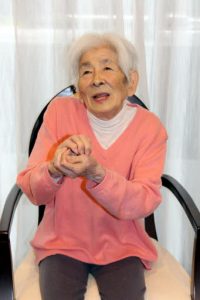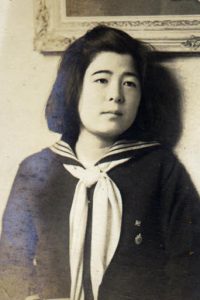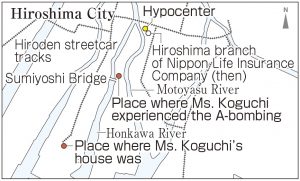Survivors’ Stories: Matsue Koguchi, 94, Hiroshima: Taking the next bus enabled her to escape death
Oct. 7, 2019
by Kyoko Niiyama, Staff Writer
Matsue Koguchi (née Asao), 94, has never before shared her experience of the atomic bombing beyond her family. After the war, she was busy raising her children and sought to live her life to the fullest each day, but now she is over 90 years old and she feels strongly that she must convey her experience to young people before she is too old to do so. With the encouragement of her family, too, she decided to share her experience for this article by looking back at her painful memories of the atomic bombing.
Back then, there were nine people in her family: her father Rokunojo, her mother Wasa, her six siblings, and Ms. Koguchi herself. Ms. Koguchi was the fifth born among her siblings. Her parents cultivated a field by their house in Eba-machi (now part of Naka Ward) with the money they had earned when they were in the United States for a while as emigrants, and they made a living by selling the vegetables they grew.
After Ms. Koguchi graduated from Shintoku Girls’ High School, she worked for the Hiroshima branch of Nippon Life Insurance Company. In 1945, she was 20 years old. On the morning of August 6, she took a bus from nearby her house and went to work as usual. On that day, there were so many passengers on the bus that she usually took that she decided to catch the next one.
When the bus crossed the Sumiyoshi Bridge and came to Kako-machi (now part of Naka Ward), there was a sudden flash of light. Powerful hot winds blew into the bus, and it became hard to breathe, so she leaped from the bus in desperation, covering her mouth with her handkerchief.
Ms. Koguchi was about 900 meters from the hypocenter. Other passengers on the bus were seriously injured, and some were killed instantly, but miraculously, she suffered only minor injuries because she was standing in the middle of the crowded bus.
She desperately wanted to return home, but a soldier who was there in the utter chaos told her, “The way toward Eba is dangerous, too.” At a loss, she decided to walk to her workplace. The building of her company was located only about 180 meters from the hypocenter, and the second floor had fallen in and the walls were sharply tilted. Twenty-eight of her colleagues fell victim to the atomic bomb that day.
If she had left for the city center on the earlier bus, she would have already arrived at ground zero of the A-bomb attack when the bomb was dropped. Regarding the horrific scenes she witnessed, she said, “I don’t want to speak about them. Only those who experienced the atomic bombing can understand its horror.”
On the afternoon of August 6, when Ms. Koguchi reached her home, a dozen soldiers and teachers from a school near her house who had suffered severe wounds were lying, crowded together, in the garden and in the living room. She heard them groaning with pain, here and there. It was like a first-aid station. She cooked rice, which was kept in her family’s air-raid shelter, and made them rice balls. In the back of her mind she felt reluctant to give them rice balls because rice was more precious than anything during the war. But she thought that she had to help others when they were in need.
Her father was exposed to the atomic bomb while in the Funairi district (now part of Naka Ward) and suffered severe burns to his lower body. If pus from his wounds had not been drained every day, his body would have become infested with maggots. Ms. Koguchi vividly recalls how hard her father worked, walking with a shuffle, to help care for survivors who had been more severely wounded than him.
Her father’s brother and his son fled from Tokaichi-machi (now part of Naka Ward), but they passed away soon after. When she carried their bodies to the nearby Eba military shooting range to cremate them, the site was strewn with corpses that no one had claimed.
At the age of 23, Ms. Koguchi married Shinsaku Koguchi, who lived in the same neighborhood. She has three children, seven grandchildren, and 16 great-grandchildren. She now lives peacefully in a nursing home located in Naka Ward.
“War must not be waged,” she said, a sentiment that comes to mind whenever she’s feeling happy, surrounded by her large family. “I hope for a world where everyone will smile as they shake hands so that children can live their lives in peace,” said Ms. Koguchi, sharing her strong conviction.
Teenagers’ Impressions
Supporting one another is important
It seems to me that the members of Ms. Koguchi’s family were being very considerate when they gave their precious food to the wounded people who had fled to her house and when they cremated the dead by themselves amid the chaos after the A-bomb attack. She said that after the war she mingled with Americans, though the United States had dropped the bomb. I think it’s important that we support one another, as the same human beings, without feelings of bitterness. (Felix Walsh, 17)
Impressed by her words, “Living in harmony with the world”
I think it was a miracle that Ms. Koguchi survived thanks to good fortune, like taking a different bus that morning, and now has many grandchildren and great-grandchildren. I was struck by her words, “I hope that everyone will live in harmony with people around the world to rid the world of conflict.” I will actively communicate with people from other countries and help them understand Japan. (Yui Morimoto, 15)
(Originally published on October 7, 2019)
Matsue Koguchi (née Asao), 94, has never before shared her experience of the atomic bombing beyond her family. After the war, she was busy raising her children and sought to live her life to the fullest each day, but now she is over 90 years old and she feels strongly that she must convey her experience to young people before she is too old to do so. With the encouragement of her family, too, she decided to share her experience for this article by looking back at her painful memories of the atomic bombing.
Back then, there were nine people in her family: her father Rokunojo, her mother Wasa, her six siblings, and Ms. Koguchi herself. Ms. Koguchi was the fifth born among her siblings. Her parents cultivated a field by their house in Eba-machi (now part of Naka Ward) with the money they had earned when they were in the United States for a while as emigrants, and they made a living by selling the vegetables they grew.
After Ms. Koguchi graduated from Shintoku Girls’ High School, she worked for the Hiroshima branch of Nippon Life Insurance Company. In 1945, she was 20 years old. On the morning of August 6, she took a bus from nearby her house and went to work as usual. On that day, there were so many passengers on the bus that she usually took that she decided to catch the next one.
When the bus crossed the Sumiyoshi Bridge and came to Kako-machi (now part of Naka Ward), there was a sudden flash of light. Powerful hot winds blew into the bus, and it became hard to breathe, so she leaped from the bus in desperation, covering her mouth with her handkerchief.
Ms. Koguchi was about 900 meters from the hypocenter. Other passengers on the bus were seriously injured, and some were killed instantly, but miraculously, she suffered only minor injuries because she was standing in the middle of the crowded bus.
She desperately wanted to return home, but a soldier who was there in the utter chaos told her, “The way toward Eba is dangerous, too.” At a loss, she decided to walk to her workplace. The building of her company was located only about 180 meters from the hypocenter, and the second floor had fallen in and the walls were sharply tilted. Twenty-eight of her colleagues fell victim to the atomic bomb that day.
If she had left for the city center on the earlier bus, she would have already arrived at ground zero of the A-bomb attack when the bomb was dropped. Regarding the horrific scenes she witnessed, she said, “I don’t want to speak about them. Only those who experienced the atomic bombing can understand its horror.”
On the afternoon of August 6, when Ms. Koguchi reached her home, a dozen soldiers and teachers from a school near her house who had suffered severe wounds were lying, crowded together, in the garden and in the living room. She heard them groaning with pain, here and there. It was like a first-aid station. She cooked rice, which was kept in her family’s air-raid shelter, and made them rice balls. In the back of her mind she felt reluctant to give them rice balls because rice was more precious than anything during the war. But she thought that she had to help others when they were in need.
Her father was exposed to the atomic bomb while in the Funairi district (now part of Naka Ward) and suffered severe burns to his lower body. If pus from his wounds had not been drained every day, his body would have become infested with maggots. Ms. Koguchi vividly recalls how hard her father worked, walking with a shuffle, to help care for survivors who had been more severely wounded than him.
Her father’s brother and his son fled from Tokaichi-machi (now part of Naka Ward), but they passed away soon after. When she carried their bodies to the nearby Eba military shooting range to cremate them, the site was strewn with corpses that no one had claimed.
At the age of 23, Ms. Koguchi married Shinsaku Koguchi, who lived in the same neighborhood. She has three children, seven grandchildren, and 16 great-grandchildren. She now lives peacefully in a nursing home located in Naka Ward.
“War must not be waged,” she said, a sentiment that comes to mind whenever she’s feeling happy, surrounded by her large family. “I hope for a world where everyone will smile as they shake hands so that children can live their lives in peace,” said Ms. Koguchi, sharing her strong conviction.
Teenagers’ Impressions
Supporting one another is important
It seems to me that the members of Ms. Koguchi’s family were being very considerate when they gave their precious food to the wounded people who had fled to her house and when they cremated the dead by themselves amid the chaos after the A-bomb attack. She said that after the war she mingled with Americans, though the United States had dropped the bomb. I think it’s important that we support one another, as the same human beings, without feelings of bitterness. (Felix Walsh, 17)
Impressed by her words, “Living in harmony with the world”
I think it was a miracle that Ms. Koguchi survived thanks to good fortune, like taking a different bus that morning, and now has many grandchildren and great-grandchildren. I was struck by her words, “I hope that everyone will live in harmony with people around the world to rid the world of conflict.” I will actively communicate with people from other countries and help them understand Japan. (Yui Morimoto, 15)
(Originally published on October 7, 2019)










